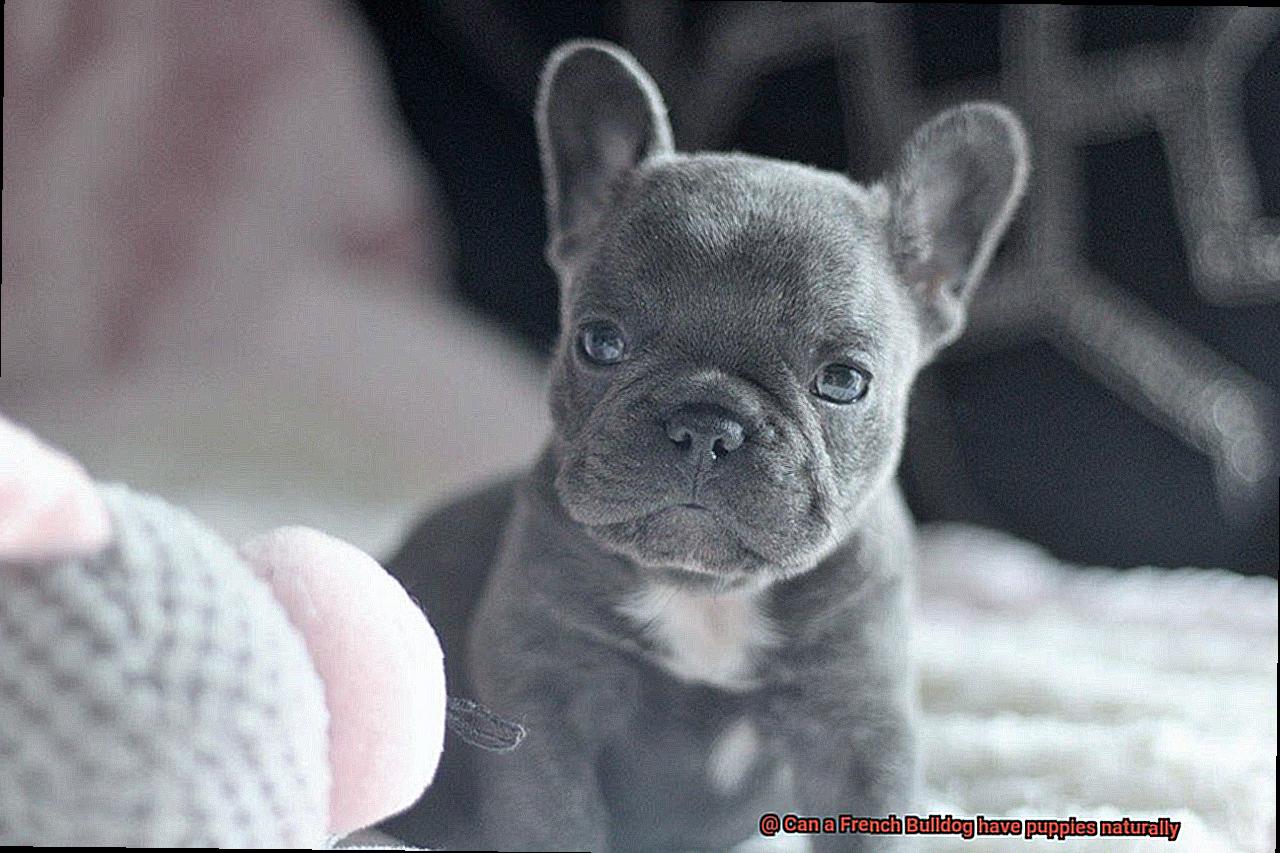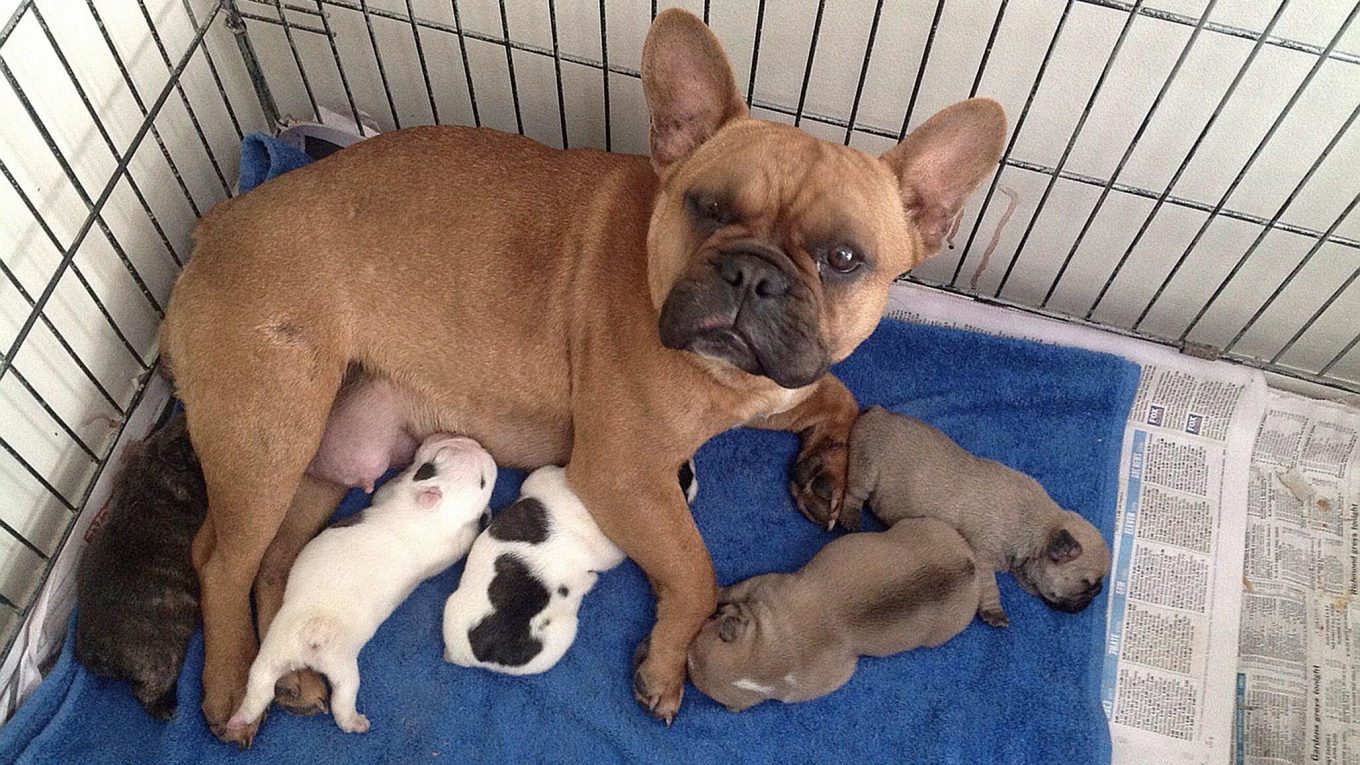Can a French Bulldog have puppies naturally?
You’ve fallen head over paws for those squishy-faced, snuggly French Bulldogs. Can you blame yourself? They’re like little bundles of cuteness and charm. But here’s the million-dollar question that has been bugging French Bulldog fanatics: can these adorable furballs actually have puppies naturally?
Well, my fellow Frenchie enthusiasts, today we’re going to unravel the truth behind all those myths and misconceptions about French Bulldog reproduction. We’ll be diving deep into their unique breeding challenges and exploring the potential risks and concerns that come with it. Whether you’re already a proud French Bulldog parent or just dreaming of becoming one, this blog post is your ultimate guide to understanding the realities of French Bulldog reproduction.
So buckle up, grab a cup of coffee (or a treat for your furry friend), and let’s embark on this fascinating journey into the world of French Bulldog reproduction. It’s time to separate fact from fiction and uncover what it really takes for these lovable pups to bring more joy into our lives naturally. Let’s get started.
Overview of the Brachycephalic Structure of French Bulldogs
Contents
- 1 Overview of the Brachycephalic Structure of French Bulldogs
- 2 Potential Health Issues Related to Reproduction in French Bulldogs
- 3 How the Size of a French Bulldog Affects Natural Reproduction
- 4 How to Increase the Chances of Successful Natural Reproduction in French Bulldogs
- 5 Female Reproductive Challenges for French Bulldogs
- 6 Male Reproductive Challenges for French Bulldogs
- 7 The Need for Assisted Reproductive Techniques in Some Cases
- 8 Not All French Bulldogs Encounter Difficulties with Natural Reproduction
- 9 Conclusion
French Bulldogs have stolen the hearts of many with their adorable flat faces and friendly personalities. However, their brachycephalic structure, characterized by a shortened skull and flat face, can pose challenges when it comes to natural breeding and childbirth. In this article, we will explore how this unique structure affects French Bulldogs’ ability to reproduce naturally and provide helpful insights for pet owners considering breeding. So, let’s dive in and learn more about the brachycephalic structure of French Bulldogs.
The Brachycephalic Structure:
French Bulldogs are born with a distinctively flat face and a skull that is shorter than other breeds. This unique structure gives them their adorable appearance but also comes with potential health issues. With narrow nostrils, elongated soft palates, and narrowed tracheas, French Bulldogs may experience respiratory problems that can affect their ability to breed naturally.
Challenges with Natural Breeding:
The brachycephalic structure can make natural breeding difficult for French Bulldogs. Mating may be challenging due to the elongated soft palate and narrowed trachea, which can impede normal breathing during the process. Female French Bulldogs may also face difficulties conceiving naturally due to reproductive organ issues or hormonal imbalances.
Childbirth Complications:
The size of a French Bulldog’s head relative to their body can present obstacles during childbirth. The puppies’ heads may be too large to pass through the narrow birth canal of a brachycephalic mother, increasing the risk of complications during labor. As a result, caesarean sections or other assisted reproductive techniques are often recommended.
Artificial Insemination as an Option:
To mitigate the challenges associated with natural breeding, artificial insemination is commonly suggested for French Bulldogs. This controlled breeding method reduces physical strain on the female dog’s respiratory system, increasing the chances of successful conception.
Seeking Veterinary Guidance:
It is crucial to consult with a veterinarian experienced in brachycephalic breeds when considering breeding French Bulldogs. They can assess your dog’s overall health and provide guidance on the best reproductive options for your pet.
Potential Health Issues Related to Reproduction in French Bulldogs
However, it’s important to be aware of the potential health issues related to reproduction in this breed. In this article, we will discuss the potential health concerns that French Bulldogs may face during breeding and childbirth, as well as provide insights and tips for responsible pet ownership.
Brachycephalic Airway Syndrome:
One of the most common health issues in French Bulldogs is Brachycephalic Airway Syndrome. This condition is a result of their unique skull shape and flat faces, which can lead to breathing difficulties. During labor and delivery, these breathing problems can pose challenges for female French Bulldogs. It’s crucial to monitor their breathing and seek veterinary assistance if any complications arise.
Predisposition to Cesarean Sections:
Due to their distinctive anatomy, particularly the size and shape of their heads, French Bulldogs often face difficulties during natural birth. The puppies’ large heads may struggle to pass through the mother’s birth canal, making cesarean sections a common necessity for safe delivery. Consulting with a veterinarian experienced in French Bulldog reproduction is essential to ensure a smooth birthing process.
Reproductive Disorders:
Infertility and difficulty conceiving are also potential reproductive issues in French Bulldogs. Hormonal imbalances, anatomical abnormalities, or genetic predispositions can contribute to these problems. Female French Bulldogs may experience irregular heat cycles or fail to conceive despite repeated mating attempts. Seeking veterinary guidance and considering alternative breeding methods such as artificial insemination can increase the chances of successful reproduction.
Male Reproductive Challenges:
Reproduction challenges are not limited to females; male French Bulldogs may also face difficulties in impregnating females due to reduced sperm quality or quantity. Genetic factors and other underlying health conditions can affect male fertility. Consulting with a veterinarian and conducting thorough reproductive health checks are crucial for successful breeding.
While reproduction in French Bulldogs may present some challenges, responsible breeding practices and veterinary guidance can help ensure the well-being of both the mother and her puppies. It’s essential for French Bulldog owners to be aware of these potential health issues and take proactive steps to minimize risks.
By prioritizing the health of our beloved companions, we can continue to enjoy the joys of owning French Bulldogs while promoting their overall well-being.
How the Size of a French Bulldog Affects Natural Reproduction
If you’ve been wondering how the size of your furry friend affects their ability to reproduce naturally, you’ve come to the right place. In this pawsome blog post, we’ll dig into the nitty-gritty details of how size can play a role in the reproduction process for French Bulldogs. So grab a treat and let’s get started.
The Birthing Blues:
Picture this – a petite mama French Bulldog with a narrow pelvis trying to give birth to her adorable puppies. Unfortunately, her size can make it quite challenging for those little nuggets to pass through the birth canal. Ouch. This is why many breeders opt for assisted reproductive techniques or even consider cesarean sections to ensure a safe delivery for both mom and pups.
Mating Mysteries:

Now let’s talk about the gentlemen in the room, the male French Bulldogs. These little studs sometimes have trouble mounting larger females due to their smaller size and shorter stature. It’s like trying to reach the top shelf when you’re just a few inches too short. Don’t worry, though – with a helping hand from breeders or artificial insemination, love can still find a way.
Consult with the Experts:
When it comes to reproducing naturally, it’s essential to consult with a knowledgeable veterinarian or reproductive specialist. They can provide valuable advice on whether natural reproduction is feasible for your specific French Bulldog. Remember, it’s all about ensuring the health and well-being of your furry family members.
Litter Size Woes:
French Bulldogs may be small but mighty, but their size does affect the number of puppies they can carry. Compared to larger breeds, Frenchies typically have smaller litters. So if you’re planning on expanding your Frenchie family, keep this in mind and manage the health of the mama-to-be accordingly.
Conclusion:
While French Bulldogs can face challenges with natural reproduction due to their size, it’s important to prioritize their well-being. Consulting with experts, considering alternative methods like artificial insemination, and focusing on the health of both mom and pups are crucial steps in ensuring a successful and safe breeding process.
How to Increase the Chances of Successful Natural Reproduction in French Bulldogs
French Bulldogs are beloved pets known for their unique appearance and friendly nature. However, due to their brachycephalic structure, they may face challenges when it comes to natural reproduction.
In this blog post, we will explore five key factors that can increase the chances of successful natural reproduction in French Bulldogs.
Ensuring Good Health:
To increase the chances of successful natural reproduction, it is crucial to prioritize the overall health of both the male and female dogs. Regular veterinary check-ups, vaccinations, and a balanced diet are essential. These measures help identify and address any underlying health issues that may affect their reproductive abilities.
Timing Is Everything:
Understanding the female French Bulldog’s heat cycle is vital for successful reproduction. The optimal time for breeding is usually around the 11th to 14th day of her heat cycle. Monitoring her physical signs, such as swelling of the vulva and changes in discharge, can help determine the right time for mating. Ovulation tests and progesterone level monitoring can also be useful tools.
Providing Proper Nutrition:
A balanced diet is essential for supporting reproductive health in both male and female French Bulldogs. Feeding them high-quality dog food that meets their nutritional needs can improve fertility. Essential nutrients such as vitamins and minerals play a crucial role in increasing the chances of successful natural reproduction.

Creating a Stress-Free Environment:
Stress can negatively impact fertility in dogs, so it is important to create a calm and comfortable environment for breeding. Minimize external disturbances, provide privacy, and allow ample time for the male and female dogs to become familiar with each other before attempting to mate.
Seek Professional Guidance:
Breeding French Bulldogs requires expertise and knowledge of canine reproduction. If you encounter any concerns or difficulties during the breeding process, it is recommended to seek assistance from a professional veterinarian or an experienced breeder. They can provide valuable guidance and address any specific issues that may arise.
Female Reproductive Challenges for French Bulldogs
If you’re considering breeding your precious Frenchie, it’s important to understand the unique reproductive challenges that these adorable pups face. In this article, we’ll dive deeper into the potential hurdles that can arise during the breeding process and how to navigate them successfully.
Pelvic Structure: The Birth Dilemma
French Bulldogs have a narrow pelvic structure, making natural delivery a bit tricky. Their compact heads further complicate matters, as they can be larger than their petite bodies. This combination can lead to difficulties during labor and increase the risk of complications for both mother and puppies.
Heat Intolerance: A Cause for Concern
Due to their brachycephalic nature (shortened skull shape and narrowed airways), French Bulldogs struggle with regulating body temperature. This becomes even more challenging during pregnancy when increased metabolic demands put additional strain on their respiratory system. Extra care must be taken to provide a cool and comfortable environment for these moms-to-be.
Reproductive Disorders: The Invisible Culprits
Infertility and hormonal imbalances are common reproductive issues in French Bulldogs. Some females may have difficulty ovulating or producing viable eggs, while others may experience irregular heat cycles or fail to show signs of being in heat altogether. Regular check-ups and pre-breeding health screenings are essential to identify any underlying problems.
Collaborate with a Canine Reproduction Expert
Breeding French Bulldogs is no walk in the park. It’s crucial to partner with a veterinarian who specializes in canine reproduction. They can perform genetic testing, offer advice on timing the mating process, and identify potential anatomical or health issues that may affect your Frenchie’s ability to conceive and carry a pregnancy to term.
Assisted Reproductive Technologies: A Helping Hand
In some cases, assisted reproductive technologies like artificial insemination or surgical intervention may be necessary to ensure a successful pregnancy and safe delivery. These techniques can bypass the anatomical challenges faced by French Bulldogs, giving them a better chance at becoming proud parents.
Male Reproductive Challenges for French Bulldogs
French Bulldogs are beloved pets known for their friendly nature and distinctive appearance. However, when it comes to reproduction, male French Bulldogs can face certain challenges. In this article, we will explore the common reproductive issues that male French Bulldogs may encounter and discuss potential causes and treatment options.
Infertility:
One of the main reproductive challenges faced by male French Bulldogs is infertility. This refers to the inability to conceive or produce viable offspring. Infertility in male dogs can be caused by genetic issues, hormonal imbalances, testicular abnormalities, and infections.
Genetic Issues:
Genetic conditions play a significant role in male infertility in French Bulldogs. These conditions can affect the quality and quantity of sperm produced by the male dog. Some genetic issues are inherited from the parents, while others occur spontaneously.
Hormonal Imbalances:
Hormonal imbalances can impact the reproductive capabilities of male French Bulldogs. Hormones like testosterone are crucial for sperm production and maturation. Disruptions in hormonal levels can lead to decreased sperm count and motility, affecting the dog’s ability to impregnate a female.
Testicular Abnormalities:
Testicular abnormalities are common reproductive challenges faced by male French Bulldogs. Cryptorchidism, where one or both testicles fail to descend into the scrotum, is a notable condition. It can cause infertility or increase the risk of testicular cancer.
Infections:
Infections, especially those affecting the reproductive organs, can hinder natural reproduction in male French Bulldogs. Bacterial or viral infections can damage the reproductive system and impair sperm production and function.
Age can also be a factor in male reproductive challenges. As male French Bulldogs age, their fertility may decrease due to a decline in sperm quality and quantity.
Proactive Measures:
It is crucial for French Bulldog owners to be aware of these potential reproductive challenges and take proactive measures. Regular veterinary check-ups, including reproductive health assessments, can help identify any potential issues early on.
Treatment Options:
If a male French Bulldog is experiencing reproductive challenges, there are various treatment options available depending on the underlying cause. Hormone therapy, surgical interventions, and assisted reproductive techniques such as artificial insemination or in vitro fertilization may be recommended by a veterinarian.
The Need for Assisted Reproductive Techniques in Some Cases
French Bulldogs are beloved pets known for their adorable appearance and affectionate nature. However, due to their unique anatomy and genetic predispositions, some breeders and owners may encounter difficulties when it comes to reproduction. In such cases, assisted reproductive techniques become invaluable tools that ensure the health and well-being of both the mother and the puppies. Let’s explore the reasons why some French Bulldog breeders and owners may need to turn to these techniques.
Unique Challenges Faced by French Bulldogs:
- Brachycephalic Skull Shape: The distinctive skull shape of French Bulldogs can lead to breathing problems and physical limitations during mating, making natural reproduction challenging.
- Narrow Hips and Large Head Size: Narrow hips combined with a larger head size in proportion to their body make it difficult for French Bulldogs to deliver puppies through natural birth. This can pose risks for both the mother and the puppies.
- High Rate of Infertility: French Bulldogs are prone to various genetic disorders and health issues, resulting in a higher rate of infertility compared to other breeds. Assisted reproductive techniques offer hope for successful reproduction in these cases.
Assisted Reproductive Techniques for French Bulldogs:
- Artificial Insemination: This technique bypasses the physical limitations of natural mating by directly introducing semen into the female’s reproductive tract. It offers a higher success rate and allows breeders to overcome the challenges posed by the breed’s anatomy.
- Caesarean Section Deliveries: Due to their narrow birth canal and the large head size of French Bulldog puppies, caesarean section deliveries are often necessary to prevent complications during labor. This ensures a safe delivery for both the mother and the puppies.
Assisted reproductive techniques have become essential tools for breeders and owners of French Bulldogs facing reproductive challenges.
Whether it’s artificial insemination to overcome physical limitations or caesarean section deliveries to ensure the safety of both mother and puppies, these techniques play a crucial role in preserving the breed and prioritizing the well-being of the dogs involved.
By understanding the unique challenges faced by French Bulldogs and utilizing these techniques, breeders and owners can continue to enjoy the companionship and joy that these adorable dogs bring into our lives.
Not All French Bulldogs Encounter Difficulties with Natural Reproduction
French Bulldogs are known for their distinctive appearance and lovable personalities. However, there is a common misconception that all French Bulldogs face difficulties with natural reproduction. In this blog post, we will explore why not all French Bulldogs experience reproductive issues and discuss the factors that contribute to successful natural reproduction.
Individual Health and Genetics:
The key to determining whether a French Bulldog can reproduce naturally lies in their individual health and genetics. While the breed as a whole is prone to reproductive issues, some French Bulldogs are fortunate to have good health and no genetic abnormalities that affect their ability to mate or conceive.
Responsible Breeding Practices:
Responsible breeders understand the importance of assessing the health and genetic history of both the male and female French Bulldogs before breeding. Conducting thorough health screenings, including hip and elbow evaluations, eye examinations, and genetic testing for breed-specific conditions, can help identify potential reproductive challenges.
Alternative Methods:
In cases where natural reproduction is not possible, there are alternative methods available to assist with breeding. Artificial insemination and surgical interventions such as caesarean section deliveries can overcome certain reproductive challenges, ensuring the successful reproduction of French Bulldogs.
Collaboration with Veterinary Professionals:
Close collaboration with veterinarians or reproductive specialists is crucial for French Bulldog owners who wish to breed their dogs. These professionals can provide guidance on breeding practices, perform necessary health screenings, and offer advice on timing and techniques to maximize the chances of successful natural reproduction.
Increased Knowledge and Awareness:
As more information becomes available about the reproductive challenges faced by French Bulldogs, breeders and owners are becoming increasingly aware of the importance of responsible breeding practices. This increased knowledge allows for informed decisions regarding breeding, reducing the likelihood of reproductive issues in future generations.
LSzJWlWirwU” >
Conclusion
In conclusion, it is important to understand that French Bulldogs often require assistance when it comes to breeding and giving birth. Due to their unique physical characteristics, such as their small size and narrow hips, natural mating and birthing can be quite challenging for them. Breeding a French Bulldog naturally can put both the mother and puppies at risk of complications and even death.
However, with the help of modern veterinary techniques, it is possible for a French Bulldog to have puppies through artificial insemination or caesarean section. These methods ensure the safety of both the mother and her offspring.
While some may argue that natural reproduction is essential for preserving the breed’s genetic diversity, it is crucial to prioritize the health and well-being of these adorable dogs. Responsible breeding practices should focus on maintaining the breed’s overall health rather than solely relying on natural reproduction.
So, if you are considering breeding your French Bulldog, it is highly recommended to consult with a veterinarian who specializes in reproductive medicine. They can guide you through the process and help ensure a safe and successful pregnancy for your furry friend.
Remember, while French Bulldogs may face challenges in reproducing naturally, they still bring immense joy and companionship into our lives.




